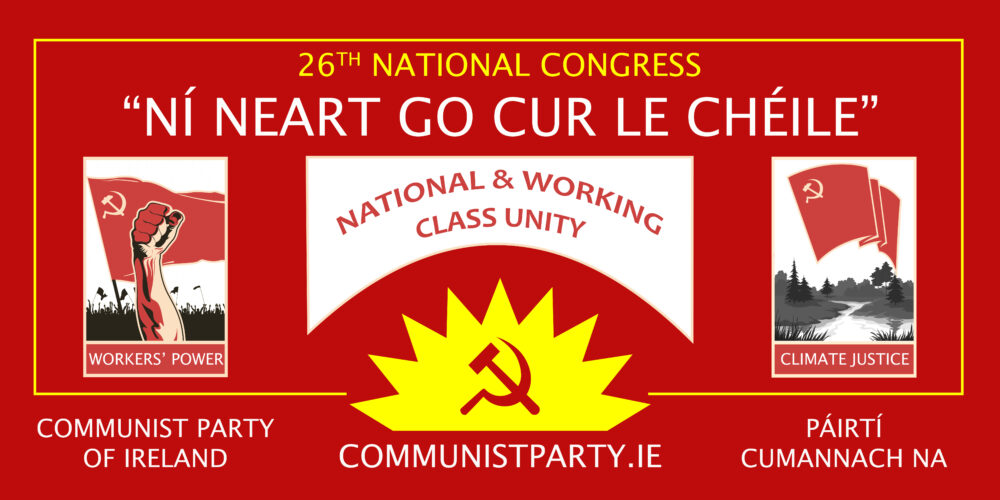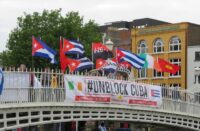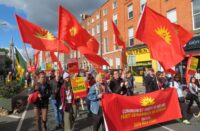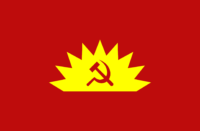Under the slogan “National and Class Unity,” the Communist Party of Ireland held its 26th National Congress over the weekend of 17 and 18 September in Dublin. The congress brought together communists from around Ireland to discuss and vote upon the political resolution and a new constitution. It was the culmination of months of debate in the party branches on the draft political resolution and the draft new constitution presented by the National Executive Committee.
The congress took place as the attacks on working people’s living standards continue to grow, the crisis of the system intensifies, and the military and economic aggressiveness in the form of sanctions by imperialism against peoples and countries they wish to control, led by the United States, grows in intensity.
The mood at the congress was very buoyant and confident, with a significant number of new members attending, while the age profile of the CPI has also dropped, reflecting the growth in membership and increased activity.
One of the central questions contained in the political resolution was our evaluation of the current situation, the contradictions thrown up by Brexit, a new evaluation of the role and impact of the Belfast Agreement, and our continued resistance to the triple lock of imperialism—US, EU, and British—on the lives of the people of Ireland.
Of course the war in Ukraine was also a feature during the debate, and how we need to step up the peace struggle and the defence of Irish neutrality.
The main thrust of the political resolution was a further consolidation of our evolving transformative strategy, which is our understanding of current struggles and how they can be developed into all-Ireland struggles that strengthen the national character of the resistance to imperialist domination and control.
Our task is to give a clear class transformative understanding to current struggles, to try to shape and develop them in a way that strengthens the power of workers and weakens the power of capital, to raise the class-consciousness of those engaged in struggle. This will weaken the mechanism of control and help build the independent political role of the class.
To this end the congress adopted a “Unity Programme: A Pathway Forward: Building Working-Class Resistance.” Such a unity programme will endeavour to move beyond the mere aspiration of a “united Ireland” and to develop a strategy for building the forces that will bring it about. It will develop national demands that mobilise the working class on an all-Ireland basis. It will continue to resist the interference of British imperialism in the affairs of the people of Ireland and the subservience of the Irish government to the interests and needs of imperialism in the form of the triple lock.
This work is already under way, and the congress further clarified and deepened this strategy. The CPI puts forward such demands as an all-Ireland public health service, free at the point of demand, as central to creating the building-blocks of working-class unity. Other crucial elements include an all-Ireland public housing strategy, a state-led national industrial development strategy linked to sustainability, and an all-Ireland strategy on workers’ rights and repealing all anti-worker laws.
The congress reaffirmed the CPI’s opposition to the European Union and especially to any further integration and the growing militarisation of the EU. The Unity Programme is for strengthening the struggles for national sovereignty and democracy. Also of importance is the defence of the national language and culture as critical elements in the resistance to imperialism.
The congress also reinforced the need for working-class activists to be involved in the trade union movement, to bring working-class needs and interests into the heart of the trade union movement and to break the compliant nature of the current trade union leadership. The “cost of capitalism” crisis provides an opportunity to raise serious questions about the nature of the system imposed upon us, about which demands will push the boundaries and limitations imposed on our class by the system. It provides an opportunity to expose the narrow framework within which discussion and action are allowed to take place.
The 26th Congress was a very challenging but democratic forum, bringing together, as it did, different generations with different levels of experience.
The new party constitution ends the last elements of partitionist structures, which fostered a partitionist mentality among some, which had become an impediment to the development of a strong all-Ireland party, preventing the development of clear all-Ireland strategies for moving forward. The congress reinforced the class and anti-imperialist nature of the CPI and its ideological approach to the national democratic question facing the people of Ireland.
The congress elected a new leadership, one third of whom have not been members of the National Executive Committee before. The election also brought about a shift in the age profile of the leadership, more reflective of the growing number of younger activists.
The final act of the 26th Congress was the adoption of a motion of international solidarity, which reaffirms the class and anti-imperialist world view of the Communist Party of Ireland.
The CPI moves forward more united than before. The young activists are more than willing to write their own pages to be added to 101 years of struggle and resistance by the Communist Party of Ireland.






